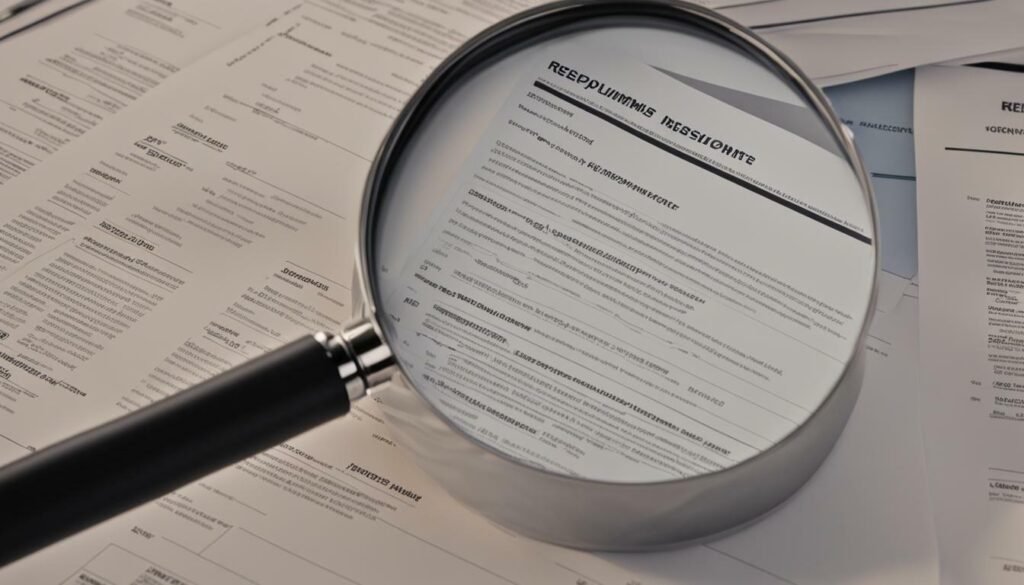Lying about your employment history on a job application can have significant implications for your career. It may seem tempting to embellish or fabricate details to make yourself appear more qualified, but the consequences can be severe. Employers value honesty and integrity, and any dishonesty in your application can lead to serious repercussions.
When you lie about your employment history, there are several potential consequences you need to be aware of. These include:
- Not getting the job: If the employer discovers the falsehood, they may reject your application outright.
- Losing the job if already hired: If you’re hired based on false information and the truth comes out later, it can result in termination.
- Damage to your reputation: Lying undermines trust and can tarnish your professional image.
- Ineligibility for unemployment benefits: Lying about employment history may disqualify you from receiving benefits if you lose your job.
- Losing a professional license: Certain professions require strict honesty, and lying can result in the revocation of your license.
- Potential criminal charges: In some cases, providing false information to gain employment or professional advantages can lead to legal consequences.
If you’ve already lied on your resume, it’s crucial to address the issue honestly. Correct any discrepancies by updating your resume and resend it. Alternatively, you may choose to withdraw your application if you feel the dishonesty is too significant. During an interview, if asked about any inaccuracies, it’s best to tell the truth and explain your reasoning.
Instead of resorting to lies, it’s better to address any gaps in your employment history honestly. Employers understand that life circumstances can lead to gaps, and explaining them positively can show personal growth and development. Education, travel, volunteer work, or freelance projects can all be valid reasons for employment gaps.
Key Takeaways
- Lying about employment history can have severe consequences for your career.
- Potential implications include not getting the job, losing the job if already hired, damaging your reputation, being ineligible for unemployment benefits, losing a professional license, and potentially facing criminal charges.
- If you’ve lied on your resume, address the issue honestly and correct any discrepancies.
- Be honest about employment gaps and use them as an opportunity to highlight personal growth and development.
- Always prioritize honesty and integrity in job applications and interviews to avoid long-term negative effects on your career.
Discover the Consequences of Lying About Employment History
Lying on your resume or job application can lead to serious repercussions, affecting not only your current job search but also your future career prospects. The consequences of providing false information about your employment history can be far-reaching and have long-lasting effects on your professional reputation. It’s essential to understand the potential impact of dishonesty and the penalties that may follow.
Employers have various methods to verify the accuracy of the information provided in your application. Background checks, reference checks, and scrutinizing details on your resume are common practices. If you lie about your employment history, you run the risk of being caught and facing the consequences.
The penalties for lying on a job application can be severe. First and foremost, your chances of getting the job you applied for may be completely jeopardized. Employers value trust and integrity, and dishonesty during the hiring process can be an immediate deal-breaker. If you are already hired based on false information, the discovery of your deception can lead to termination.
| Consequences of Lying About Employment History | Possible Penalties |
|---|---|
| Losing the job | Termination, being fired |
| Damage to your reputation | Loss of trust, credibility |
| Ineligibility for unemployment benefits | No financial support during periods of unemployment |
| Losing a professional license | Revocation of license, inability to work in regulated professions |
| Potential criminal charges | Legal ramifications, fines, or imprisonment |
Aside from immediate consequences, lying about employment history can have long-term effects on your professional reputation. It can be challenging to rebuild trust once it’s lost, and the damage to your credibility may impact future job opportunities. Additionally, providing false information can lead to being ineligible for unemployment benefits if you find yourself without a job.
To avoid these serious repercussions, it is crucial to be honest and truthful in your job applications and interviews. If you have already lied on your resume, it’s best to address it honestly and correct any discrepancies. You can update your resume and resend it, withdraw your application, or be forthcoming if asked about it during an interview. Remember, it is important to focus on addressing any resume gaps honestly and positively. Explaining reasons such as education, travel, volunteer work, or freelance work can demonstrate personal and professional growth during those periods.

Being dishonest about your employment history can have significant consequences, both immediate and long-term. It’s always best to prioritize honesty and integrity when seeking employment. By doing so, you can protect your professional reputation, build trust with potential employers, and increase your chances of long-term success in your career.
How to Handle Lied Employment History
If you find yourself in a situation where you have falsely represented your employment history, there are steps you can take to rectify the situation. It’s crucial to address the issue honestly and correct any discrepancies. Here’s how you can handle a lied employment history:
- Update your resume: Take the time to revise your resume and provide accurate information about your employment history. Highlight your relevant skills and experiences, focusing on the truth.
- Resend your resume: Once you have updated your resume, resend it to potential employers. This shows your commitment to correcting any inaccuracies and presenting yourself honestly.
- Withdraw your application: If you have submitted a job application with false information, consider withdrawing it. Honesty is crucial, and it’s better to withdraw than risk being caught in a lie.
It’s important to remember that honesty is the best policy when dealing with a lied employment history. Employers can perform background checks and verify the details on your resume, so being forthright about any discrepancies is essential.
Additionally, it’s crucial to address any gaps in your employment history honestly and positively. Employers may be concerned about gaps, but explaining reasons such as education, travel, volunteer work, or freelance work can show personal and professional growth during those periods.

By taking these steps, you can address a lied employment history and work towards rebuilding trust and credibility. It’s important to remember that lying about employment history can have long-term negative effects on your career, so it’s always best to be honest in job applications and interviews.
Not Getting the Job
The most immediate consequence of lying about your employment history is the possibility of not being hired for the job you’ve applied for. Lying on your resume can easily be caught during background checks, reference checks, or by verifying the details you have provided. Employers value honesty and integrity, and if they discover that you have lied about your employment history, it can significantly damage your chances of being considered for the position.
When employers discover a discrepancy between the information provided on your resume and the reality of your employment history, it raises concerns about your trustworthiness and credibility. They may question your ability to perform the job effectively or worry that you may engage in further dishonest behavior in the workplace. As a result, they may decide to eliminate you from the pool of candidates and move on to other applicants who have been truthful about their qualifications.
Being caught in a lie can have long-term consequences for your career. Not only will you miss out on potential job opportunities, but word of your dishonesty may spread within professional networks, damaging your reputation. Future employers may hear about your dishonesty and be less inclined to consider you for positions, even if you have the necessary skills and qualifications. It’s essential to remember that honesty is the foundation of trust, and trust is crucial in building successful professional relationships.

“Honesty and transparency make you vulnerable. Be honest and transparent anyway.” – Mother Teresa
Summary:
Lying about your employment history can have severe consequences, one of which is the possibility of not getting the job you applied for. Employers value honesty and trustworthiness, and discovering that you have lied can damage your chances of being considered for the position. Moreover, being caught in a lie can have long-term effects on your career and reputation. It’s important to remember that honesty is essential in building successful professional relationships. Instead of lying about employment gaps, focus on explaining them honestly and positively to potential employers.
Losing the Job if Already Hired
If you have already been hired based on false information about your employment history, there is a risk of losing the job if the truth comes to light. Lying about your previous employment can have severe consequences, and when your dishonesty is discovered, it can lead to immediate termination. Employers value honesty and integrity, so if they find out that you have been deceitful during the hiring process, they may feel that they can no longer trust you as an employee. This loss of trust can result in the end of your employment.
It is important to remember that background checks and reference checks are common practices for employers. These checks are designed to verify the accuracy of the information provided on your resume. If discrepancies are found, it can raise red flags and lead to further investigation. Additionally, employers may periodically review employee records, and if they discover any false information, it can have serious consequences.
When faced with the possibility of losing your job due to dishonesty, it is crucial to address the situation honestly and proactively. Take responsibility for your actions and offer an explanation if given the opportunity. Sometimes, employers may be willing to forgive and give you a chance to correct the misinformation. However, it is essential to learn from your mistake and prioritize honesty moving forward. Building a trustworthy reputation is vital for long-term career success.

| Consequence | Description |
|---|---|
| Financial instability | Losing your job can result in financial stress and insecurity, especially if you were relying on that income. |
| Emotional impact | Job loss can take a toll on your mental and emotional well-being, leading to feelings of failure, stress, and anxiety. |
| Damage to your professional reputation | Being terminated for dishonesty can tarnish your reputation and make it more challenging to secure future employment. |
It is crucial to learn from your mistakes and move forward with honesty and integrity. Be honest in your job applications and always present accurate information about your employment history. If you have gaps in your resume, explain them honestly and positively. Employers value transparency and appreciate candidates who take responsibility for their past. By being truthful and emphasizing your growth during employment gaps, you can rebuild trust and increase your chances of success in your job search.
Key Takeaways:
- False information in your employment history can lead to losing the job if discovered.
- Employers value honesty and integrity, and dishonesty can result in immediate termination.
- Background checks and reference checks are common, and discrepancies can raise red flags.
- Address the situation honestly and proactively if confronted about dishonesty.
- Learn from your mistake and prioritize honesty in future job applications.
Damaging Your Reputation
Lying about your employment history can have long-lasting consequences for your professional reputation and credibility. When employers discover that you have provided false information, they may question your integrity and ability to be trustworthy in the workplace. This can not only hinder your current job prospects but also impact future employment opportunities.

“Honesty and trustworthiness are highly valued qualities in the workplace. By lying about your employment history, you risk damaging the trust others have in you, which can be difficult to repair.” – Career Advisor
In today’s interconnected world, where information is readily available and easily shared, it is crucial to maintain a transparent and honest professional image. Employers often conduct thorough background checks and reference checks to verify the accuracy of the information provided in a resume. If discrepancies are discovered, it can lead to immediate rejection from job opportunities or termination if already hired.
Impact on Career Advancement and Networking
Besides the immediate consequences, lying about your employment history can have long-term effects on your career advancement and networking opportunities. Building a successful career involves establishing trust and credibility with colleagues, superiors, and industry peers. If your dishonesty comes to light, it can tarnish your reputation and make it difficult to forge professional relationships.
Moreover, a damaged reputation may spread within your industry, making it challenging to secure future job opportunities. Employers and recruiters rely on recommendations and referrals from trusted sources, and if there are doubts about your honesty, it can create significant obstacles in your job search.
Ineligibility for Unemployment Benefits
If your false employment history is discovered, you may become ineligible for unemployment benefits, potentially leaving you without a source of income. When applying for unemployment benefits, you are required to provide accurate information about your employment history, including the dates of your previous jobs and the reasons for leaving them. If you have lied about your employment history on your resume or job application, it can be uncovered during the verification process, which typically involves contacting your previous employers or conducting a background check.
Being caught in a lie about your employment history can have serious implications for your eligibility to receive unemployment benefits. Each state has its own eligibility requirements, but generally, if it is discovered that you have provided false information, your claim can be denied. Additionally, intentionally providing false information on a government document, such as an unemployment benefits application, can be considered fraud and may result in legal consequences.
| Consequences of Lying About Employment History | Steps to Address Lied Employment History |
|---|---|
| Not getting the job | Update your resume and resend it |
| Losing the job if already hired | Withdraw your application |
| Damaging your reputation | Tell the truth during an interview |
Steps to Address Lied Employment History
If you have already lied about your employment history, it is important to address the situation honestly and take appropriate steps to correct any discrepancies. One option is to update your resume with accurate information and resend it to prospective employers. While this may require an explanation for any discrepancies, it allows you to demonstrate your commitment to honesty and integrity.
Another option is to withdraw your application if you have not already been hired. Withdrawing your application allows you to take responsibility for the false information and avoid potential negative consequences if the lie is discovered during the hiring process.

If you are asked about the lied employment history during an interview, it is crucial to be honest and transparent. Explain the reasons behind the deception and demonstrate remorse for the dishonesty. While this may affect your chances of getting the job, it is essential to build a foundation of trust and credibility with potential employers.
Instead of resorting to dishonesty, it is recommended to address any employment gaps honestly and positively on your resume. Employers understand that gaps happen, but it is important to explain them in a way that shows personal growth and development, such as pursuing education, engaging in travel experiences, volunteering, or taking on freelance work. By highlighting your ability to use the gap period productively, you can still present yourself as a capable and dedicated candidate.
Losing a Professional License
Falsifying your employment history can have severe consequences, including the potential loss of your professional license. Disclosing false information about your employment can lead to disciplinary action or even revocation of your license, depending on the regulations and standards of your profession. Professional licenses are granted based on trust, competence, and ethical behavior. Any form of deception or dishonesty undermines these principles and can result in serious consequences. It is essential to maintain the highest level of integrity throughout your career.
Professional licensing boards and regulatory bodies have the responsibility to ensure that professionals meet the necessary qualifications and standards to practice in their respective fields. These organizations have rigorous procedures to verify the accuracy and authenticity of information provided by applicants. Lying about your employment history not only violates the trust placed in you as a licensed professional but also undermines the integrity of the entire profession.
The loss of a professional license can have significant implications for your career. It may prevent you from practicing in your chosen field, affecting your employment prospects and future earning potential. Additionally, it can tarnish your professional reputation and make it difficult to regain trust within the industry. Maintaining honesty and integrity in your professional endeavors is crucial to safeguarding your license and ensuring the continued success of your career.

Falsifying your employment history can have severe consequences, including the potential loss of your professional license.
If you have made false claims about your employment history, it is essential to take immediate action to rectify the situation. Contact the relevant licensing board or regulatory body to disclose the incorrect information and provide accurate details. Cooperate fully with any investigations or inquiries, and be prepared to face the consequences of your actions.
Prevention is always better than cure. Avoid the temptation to lie about your employment history, as the risks far outweigh any potential benefits. Instead, focus on highlighting your genuine achievements, skills, and qualifications. If you have gaps in your employment history, explain them honestly and positively, emphasizing any relevant experiences or personal development during those periods.
Remember, honesty is the foundation of a successful and fulfilling professional career. By maintaining integrity and being truthful in all aspects of your professional life, you can protect your license, build trust with colleagues and clients, and achieve long-term success.
Potential Criminal Charges
In some cases, lying about your employment history can lead to criminal charges, especially if the false information is used to obtain employment or professional benefits. It is important to understand the legal implications of providing false information on your resume or job application.
When you lie about your employment history to secure a job or gain professional advantages, you may be committing fraud. Fraudulent misrepresentation can result in criminal charges, such as identity theft, forgery, or even perjury. These charges can have serious consequences, including fines, probation, and even imprisonment.
Additionally, if you are working in a regulated profession that requires licensure, providing false information about your employment history can lead to disciplinary action. This can result in the loss of your professional license and the inability to practice in your field.
Remember, honesty is always the best policy. Providing accurate and truthful information on your resume and job applications is not only morally right but also legally required. Lying about your employment history can have severe consequences that can negatively impact your career and personal life.
Summary:
- Lying about your employment history can lead to potential criminal charges, especially if false information is used to obtain employment or professional benefits.
- Fraudulent misrepresentation can result in charges such as identity theft, forgery, or perjury.
- Working in a regulated profession and providing false employment history can lead to the loss of a professional license.
- It is essential to prioritize honesty and provide accurate information on resumes and job applications to avoid legal repercussions.

If you find yourself in a situation where you have lied about your employment history, it is essential to take appropriate steps to address the situation honestly and transparently. Lying about employment history can have serious consequences, but there are ways to handle the situation and minimize the negative impact.
To begin, it is crucial to correct any discrepancies and update your resume with accurate information. Resending an updated resume shows your commitment to rectifying the mistake and being transparent with potential employers. Make sure to emphasize your skills, qualifications, and relevant experience honestly.
If you discover that the job application process has progressed beyond the resume stage and you have already submitted false information, you may choose to withdraw your application. Withdrawing your application allows you to start afresh with a clean slate and avoids any potential legal or professional consequences that may arise from providing false information.
Alternatively, if you are asked directly about the discrepancies during an interview, it is important to tell the truth. Honesty is valued by employers, and admitting your mistake shows integrity and a willingness to take responsibility for your actions. Be prepared to explain why you made the dishonest choice, but also emphasize your commitment to learn from the experience and grow professionally.

While it is crucial to be honest about your employment history, it’s also important to address any gaps in your resume honestly. Employers understand that life circumstances can lead to gaps, but they will appreciate your transparency in explaining them. Highlight any educational pursuits, travel experiences, volunteer work, or freelance projects you may have undertaken during those periods. Showing personal growth or skills development during employment gaps can demonstrate your resourcefulness and dedication to self-improvement.
Summary
Lying about your employment history can have severe consequences, but if you find yourself in this situation, it’s essential to address it honestly. Update your resume, resend it, withdraw your application if necessary, and be truthful during interviews. Focus on explaining any gaps in your employment history honestly and positively. Being transparent and taking responsibility for your actions will show employers your integrity and commitment to personal growth.
| Consequences of Lying About Employment History | How to Handle Lied Employment History |
|---|---|
| Not getting the job | Update your resume and resend it |
| Losing the job if already hired | Withdraw your application |
| Destroying your reputation | Tell the truth during an interview |
| Being ineligible for unemployment benefits | |
| Losing a professional license | |
| Potentially facing criminal charges |
Addressing Employment Gaps Honestly
Instead of resorting to lies about your employment history, it is crucial to address any gaps honestly and positively on your resume. Employers understand that life happens, and having an employment gap is not necessarily a red flag. By explaining these gaps in a truthful and constructive manner, you can showcase your resilience, personal growth, and valuable experiences during those periods.
When addressing employment gaps, consider highlighting any educational endeavors you pursued during that time. Whether it was completing a degree program, attending relevant workshops or seminars, or acquiring new certifications, these activities show dedication and a commitment to self-improvement.
Traveling can also be a valuable experience to mention. Explaining how you used your time to explore different cultures, broaden your horizons, and gain a global perspective can demonstrate adaptability, independence, and cultural awareness.
| Ways to Address Employment Gaps Honestly |
|---|
| Educational pursuits |
| Travel experiences |
| Volunteer work |
| Freelance projects |
Volunteer work is another avenue to showcase your skills and dedication during employment gaps. Whether it was supporting a non-profit organization, participating in community initiatives, or contributing to local causes, this experience demonstrates your commitment to helping others and making a positive impact.
If you engaged in freelance work during your employment gap, be sure to highlight your accomplishments and the valuable skills you acquired. Discussing projects, clients, and the impact you had can demonstrate your ability to work independently, manage projects, and deliver results.
Remember, honesty is the best policy when addressing employment gaps on your resume. Emphasize the positive experiences and skills you gained during those periods, and be prepared to discuss them in more detail during interviews. By presenting yourself truthfully, you not only increase your chances of landing the job but also build trust and credibility with potential employers.

Lying about your employment history can have serious implications for your career, including missed job opportunities, damaged reputation, and even legal consequences. It is always best to be honest in job applications and address any resume gaps truthfully and positively.
When you lie about your employment history, the truth can easily be uncovered during background checks, reference checks, or by verifying details on your resume. Employers value honesty and integrity, and any dishonesty can result in not getting the job or losing it if you have already been hired.
Furthermore, lying about your employment history can have long-term negative effects on your professional reputation. Building trust and credibility is essential in the workplace, and dishonesty can undermine these qualities. It is important to maintain a reputation of honesty and integrity.
If you have already lied on your resume, it is crucial to address the issue honestly and correct any discrepancies. You have a few options to handle the situation: you can update your resume and resend it, withdraw your application, or tell the truth if asked about it during an interview. It is important to take responsibility for your actions and demonstrate your commitment to honesty.
Instead of resorting to dishonesty, it is better to address any employment gaps on your resume truthfully and positively. Employers may have concerns about gaps, but explaining reasons such as pursuing education, travel, volunteer work, or freelance projects can showcase personal growth and valuable experiences during those periods.
Ultimately, honesty is the best policy in job applications and interviews. Lying about your employment history can have severe consequences that can impact your future career prospects. By being truthful and transparent, you can build trust with potential employers and increase your chances of success in your professional journey.
FAQ
What are the consequences of lying about employment history?
Lying about employment history can lead to not getting the job, losing the job if already hired, damaging your reputation, being ineligible for unemployment benefits, losing a professional license, and potentially facing criminal charges.
How can lying on a resume be detected?
Lying on a resume can be detected through background checks, reference checks, and verifying details on the resume.
What should I do if I have already lied on my resume?
If you have already lied on your resume, it is best to address it honestly and correct any discrepancies. You can update your resume and resend it, withdraw your application, or tell the truth if asked about it during an interview.
How should I address employment gaps honestly?
To address employment gaps honestly, you can explain reasons such as education, travel, volunteer work, or freelance work to show growth during the gap.
What happens if I don’t get the job after lying about employment history?
Lying about employment history can result in not getting the job, as employers may uncover the dishonesty during the application process.
Can I lose a job if I have already been hired based on false employment information?
Yes, if you have been hired based on false employment information and the dishonesty is discovered, you can lose the job.
How does lying about employment history damage my reputation?
Lying about employment history can damage your professional reputation by eroding trust and credibility.
Can lying about employment history affect my eligibility for unemployment benefits?
Yes, lying about employment history can make you ineligible for unemployment benefits and have financial repercussions.
Can I lose a professional license for lying about employment history?
Yes, lying about employment history can result in the loss of a professional license, especially in regulated professions.
Can I face criminal charges for lying about employment history?
It is possible to face criminal charges for lying about employment history, particularly if the false information is used to gain employment or professional advantages.
How should I handle a situation where I have lied about my employment history?
To handle a situation where you have lied about your employment history, it is best to be honest, update your resume, withdraw your application if necessary, or address the issue truthfully during an interview.
